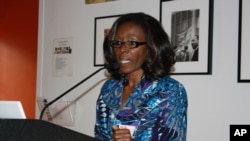A two-day New York symposium on the future of Liberia following a final report by the Truth and Reconciliation Commission (TRC) has called for the implementation of all recommendations to ensure those guilty of war crimes are punished.
The TRC was set up to look into the causes of the Liberian conflict from 1979 to 2003.
Its final report, released in December 2009, recommended the prosecution of all warring faction leaders.
It also barred President Ellen Johnson-Sirleaf and dozens of others from holding public office for 30 years for their actions during the conflict.
Joseph Gbaba, an exiled Liberian playwright and chairman of a new group called the Movement for Holistic Peace in Liberia told VOA that, instead of elections in 2011, Liberians should set up an interim government because the current leadership has been implicated in the TRC report.
‘What we are determined to see happen is that we would like, at the end of Mrs. Sirleaf’s term of office in 2011, for Liberians to have the opportunity to establish an interim government. Why we want an interim government is because those who have perpetrated crimes against the Liberian people are the ones who are the leaders of the country. And, this is not a good sign for our children to see that those who have committed atrocities are awarded with state power,” he said.
Since the report’s release, President Sirleaf, whose government commissioned and funded the TRC, has been criticized for being slow in its implementation.
Members of the president’s cabinet have said that some of report’s recommendations are unconstitutional.
Patrick Seyon, former president of the University of Liberia, who also was a panelist at the New York symposium, called for a national conference to discuss the report’s recommendations and come out with a framework for their implementation. Gbaba said he agrees with Mr. Seyon’s recommendation of a national conference.
“Definitely, because there is no way that we can establish an interim government without a national conference. So, what Dr. Seyon has said is right in place,” Gbaba said.
Gbaba said he led a delegation of Liberians to the U.S. State Department in Washington two weeks ago (October 22) where they met with the department’s desk officer for Liberia, Andrew Silski.
“One of the issues that we raised at that time was, well, we have come to the State Department to request the American government to assist us bring this carnage in Liberia to an end because the root cause of the Liberian crisis began with the mysterious release of Charles Taylor from a maximum prison in (the state of) Massachusetts. We asked the American government why he shouldn’t be held liable for the destruction that he committed in Liberia,” Gbaba said.
Ghaba said his delegation told the State Department official that, if Charles Taylor is being put on trial at the International Criminal Court in The Hague, then the rest of the Liberian warlords should be arrested and put on trial.
“The response of the official was that this is a Liberian crisis. What you want us to do is what we will do. So, you as Liberians have to come up with a decision regarding what you want to do with your warlords,” Gbaba said.
He reiterated that Liberians should immediately hold a national conference to call for the postponement of the 2011 general elections.
“Instead what we want is the establishment of an interim government because the establishment of an interim government consisting of individuals who will not be implicated in war crimes that were reported in the TRC report. They will be charged with the responsibility to make sure that a war crimes court is established, that those who committed atrocities are brought to justice,” Gbaba said.
Other speakers at the symposium included three former members of the commission, including chairman Jerome Verdier and Commissioner Massa Washington.




